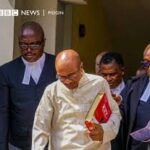The Nigeria Centre for Disease Control and Prevention (NCDC) has urged media practitioners to collaborate in ensuring accurate information dissemination and combating the spread of false narratives.
Dr Ifedayo Adetifa, Director-General of NCDC, made the call on Monday during the Track 2 “Social and Behavioral Change (SBC), Risk Communication Module and Media Fellowship Programme”.
To address the capacity gap among health journalists, NCDC, African Field Epidemiology Network (AFENET) and Breakthrough-Nigeria (BA-Nigeria) have jointly developed the Media Fellowship on Epidemiology, Infodemiology and SBC/Risk Communication.
The fellowship was developed in collaboration with Johns Hopkins Centre for Communication Programmes.
To address the capacity gap among health journalists, NCDC, African Field Epidemiology Network (AFENET) and Breakthrough-Nigeria (BA-Nigeria) have jointly developed the Media Fellowship on Epidemiology, Infodemiology and SBC/Risk Communication.
The fellowship was developed in collaboration with Johns Hopkins Centre for Communication Programmes.
The organiser said that the fellowship aimed to enhance journalists’ knowledge and skills in public health, through comprehensive training on basic epidemiology, infodemiology and SBC/Risk Communication, recognising the interdependence of the programme areas.
Dr Oyeladun Okunromade, Head of Surveillance and Epidemiology at NCDC, representing Dr Adetifa, emphasised the crucial roles of media practitioners in shaping public perception and providing timely and accurate information during public health emergencies.
The fellowship consortium designed the programme to enhance field epidemiology investment’s success and contribute to disease prevention, detection and control of outbreaks, thereby strengthening Nigeria’s health security.
Adetifa expressed gratitude for the collaborative efforts aimed at strengthening media reporting capacity and enhancing public health communication.
He emphasised the need for media and public health professionals to work together to reinforce responses to public health crises.
The training serves as a platform for sharing experiences, networking, and fostering partnerships to combat misinformation and ensure accurate public health information reaches the masses,” he said.
Prof. Mohammed Balogun, Resident Advisor at AFENET, West Africa Region, underscored the importance of the media to maintain enthusiasm and dedication in participating in the fellowship programme, expressing gratitude for participants’ commitment.
Balogun highlighted the establishment of trust and a supportive environment within the group.
He encouraged open communication and collaboration, urging participants to give their best and demonstrate confidence in their ability to succeed.
Dr Modou Njai, National Coordinator at Africa Centre for Disease Control and Prevention, Regional Coordination Centre, West Africa, recognised the crucial role of media practitioners in communicating accurate information during times of crisis such as outbreaks and emergencies.
Njai emphasised the importance of building partnerships and ensuring access to reliable data, to enhance the quality of information shared with the public, stressing the commitment to accuracy and reliability.
He expressed gratitude for the dedication of media practitioners in fulfilling their roles and contributing to public health outcomes, highlighting the significance of their collective efforts in effectively communicating with the public.










